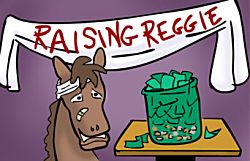Raising Reggie
November 18, 2013,by Bob Carson
Editor’s Note: The USTA website is pleased to present freelance writer Bob Carson and his popular “Outside the Box” features. This monthly series is a menu of outlandish proposals presented with a wink — but the purpose behind them is serious. The views contained in this column are that of the author alone, and do not necessarily represent the opinions or views of the United States Trotting Association.
Fundraising is the gentle art of teaching the joy of giving. — Hank Russo

Bob Carson
Most of us receive more requests for charitable dollars than we have dollars. So many fine causes, so many hard times and so many sad stories — it can all be overwhelming.
Connecting fundraising to an event is very popular. In the past few months, I played in a golf outing for a needy family, attended a minor league baseball game where the receipts helped a badly injured automobile accident victim, sponsored a Run for a Cure participant, and purchased bottles of wine in some sort of raffle/prize/ticket scheme that I still don’t understand. These activities were fun and knowing my money went to a worthy cause made it easier to write the check.
Here is a fundraising idea that would help harness racing while helping some needy causes.
You pay $100 per ticket for the “Reggie Smith Medical Costs Defrayment Night at the Racetrack Night.”

Autumn Ryan graphic
All profits go to Reggie, a really great guy who suffered serious facial and spinal injuries at 2 a.m. on Nov. 11, 2012, when he was struck by the floor after tumbling from his stool at the Stagger Inn while celebrating the winners in a rerun of the 2009 National Curling Championships on ESPN3.
When you show up at the racetrack for Reggie’s big night, you receive a sealed envelope containing prepaid, preselected tickets for races three through nine. These tickets are the core of the evening. They are real tickets. Any money you win is yours to keep. It is completely possible that you could win more than your original $100 back!
All the race tickets in each packet are for $5 to win. Everyone in the Reggie Smith group will hold identical packets. You do not select or wager. Everyone is on the same page and will be rooting for the same horse in each race.
For early arrivals there will be a free tour of the racetrack backstretch. During the evening there will be a representative from the racetrack with a microphone who will review information prior to each race. Topics will include information about the horse we have competing in each race, whether or not “our horse” has a chance, racing strategy, reading a program, explaining what went right and wrong in the race, and answering any questions on harness racing or wagering.
There will be food and drinks available; nothing fancy, picnic style for the most part, but supplemented by homemade desserts from the organization. You will have fun, you will learn a little about the sport of harness racing, you will get close to the race horses and, once again, you might win money — real money, not fruit baskets, t-shirts, floral arrangements or sleeves of golf balls.
Now is the time to ask — would people pony up and buy a ticket for the Reggie Smith event? Would friends or acquaintances accept an invitation? Would you? Why not? Even non-racing fans would consider participating in a evening like this if the intimidation factor of needing to wager is taken out. All newbies need to do is show up, have a good time and cheer for horses racing in a non-threatening environment.
In this scenario, the charity would raise a minimum of $7,000 for every 100 tickets sold ($10,000 collected minus the $3,000 for raace tickets). Also available are other money raisers (50/50 boards, blind raffles, drawings, etc).
This appears to be one of those win, win deals.
People have a good time.
The track gets some action.
We may reap a few converts to the harness racing game.
Reggie gets back on his stool.
